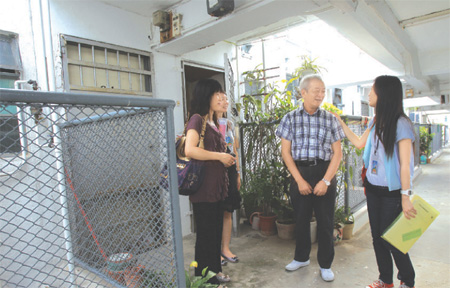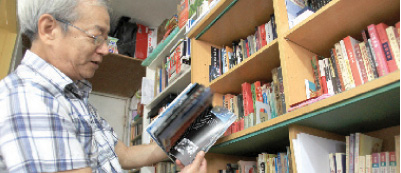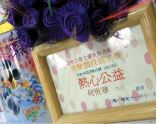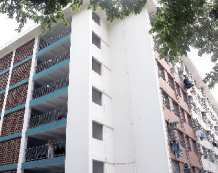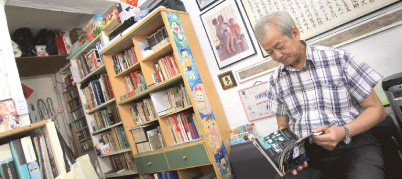The hidden elders
Updated: 2011-08-16 07:17
By Ming Yeung(HK Edition)
|
|||||||||
|
Talking to people from the Hong Kong Sheng Kung Hui Welfare Council, Ho Sai-wah says social workers are now his first choice in times of trouble. Edmond Tang / China Daily |
|
Although Ho Sai-wah, once a "hidden elder", boasts a bookshelf of travel guides and classic texts, loneliness would capture him in times when he was alone. Photos by Edmond Tang / China Daily |
Feeling rejected by their communities, elderly people often retreat into solitude, sometimes going unrecognized for the rest of their lives. Many of these lonely old people would jump at the chance to re-enter society, if only those groups designed to help were able to find them. Ming Yeung reports.
On a sweltering-hot August afternoon, Ho Sai-wah turned on his air-conditioner - something he would not normally do, and waited with eager anticipation for visitors to come.
This is a rare event, he explains to the reporter and photographer from China Daily, and the three social workers from the Hong Kong Sheng Kung Hui Welfare Council who has just climbed up nine floors to meet with him.
There's no lift in the Housing Society rental estate Ming Wah Dai Ha in Shau Kei Wan, built in the early 1960s. Ho, 68, lives there alone.
Ho's flat is neat and tidy. The walls display some Chinese calligraphy and paintings. There's a bookshelf beside the front door, where Ho keeps his favorite Chinese classics and travel books.
He points with considerable pride to one of the volumes which he boasts he bought at a real bargain at this year's Hong Kong Book Fair. It's a book of photos of the wonders of ancient Egypt. But what excites him most is the interview - and having visitors.
Ho was what is known as a "hidden elder", until he contacted Sheng Kung Hui's Holy Nativity Church Neighbourhood Elderly Centre in 2008.
"It was as though we were forgotten by the community after we retired and no one cared whether we were alive or dead," he tells China Daily.
|
Ho Sai-wah has been awarded for his active voluntary work. Edmond Tang / China Daily |
According to the Commission on Poverty, hidden elderly are those elderly people "who are disengaged from the community and disadvantaged, yet not helped by available services and support".
The Central Policy Unit released a report on people who met this description in 2008. It summed up four causes for the phenomenon of hidden elderly - inadequate capabilities, network deficiency, lack of self-reliance ethos and negative welfare experiences.
The Social Welfare Department (SWD) says it does not keep figures of hidden elders.
"According to government statistics, there are about 100,000 single elders aged 65 or above living alone in Hong Kong. Though they live alone, they could have social lives and connections to some degree with relatives, friends and the community at large," a spokesman for the department says in a written reply.
Research on hidden elderly conducted by Lingnan University's Asia-Pacific Institute of Ageing Studies (APIAS) in 2009 estimated that there were 70,000-90,000 hidden elders.
About 40 percent struggled financially on an income of HK$2,000 a month. APIAS Director Alfred Chan Cheung-ming reveals.
He describes this group of elders as "neither having enough nor starving". Some believe they manage their lives well.
Social worker Winnie Chow from the Holy Nativity Church Neighbourhood Elderly Centre says the estimated number may be "the tip of the iceberg". What's more, the number surely will increase as the population ages.
For about two decades, Ho Sai-wah had minimal contact with other people after retiring in the early 1990s. He divorced his wife. His children established their own families and moved on with their own lives. They still visit him but their visits come only occasionally.
|
Ming Wah Dai Ha accommodates a number of elders, many of whom have slipper into a state of solitude. |
Although Ho enjoys outdoor activities such as traveling and photo-shooting, he says most of the time he is on his own.
"Friends of my age have family members to attend to. I don't want to bother them," explains Ho. At festival times, however, Ho says feelings of loneliness creep over him.
"When seeing other families on the streets, I couldn't help envying their unity and happiness," Ho says with a sigh. "How great would it be if I had more friends? But it's nothing you can ask for."
Three years ago, Ho became eligible to apply for a senior citizen card - proof for elders aged 65 or over, entitling them to receive concessions from government departments - but he didn't know how and where to get them.
Passing by the elderly center one day, his attention was caught by a banner indicating he might find help there - to obtain a senior citizen card.
"It was like I grabbed a piece of wood while I was drowning at sea." So he made his first contact with the center. Still he felt no strong motivation to go there frequently.
Though he was having financial difficulties, Ho insisted not receiving social welfare.
"I don't spend lavishly; if I can survive on a little money, I won't consider receiving help," he says.
A heart attack in 2009 struck a serious blow to Ho's meager income. His condition has remained stable since he had surgery. But now he's required to take medicine regularly.
|
Poon Pui-wah, 80, a volunteer at Sheng Kung Hui's Holy Nativity Church Neighbourhood Elderly Centre, understands it takes quite a while for hidden elders to re-enter society. |
On top of feelings of profound loneliness he now faced hefty hospital fees - a couple of nasty circumstances which neither he nor most of his peers have any idea how to handle. Ho decided he needed to seek help.
Social workers' timely assistance solved the problem and eased Ho's feelings of anxiety. At the interview, he declares stoutly that social workers have become his first choice, or "top priority", when he feels troubled and needs to reach out for help.
Winnie Chow points out that older citizens are normally distrustful of others owing to traumatized events in the past but they are more willing to talk to people of the same generation.
Poon Pui-wah, 80, is one of the volunteers at the elderly center. She has been doing outreach work there for three years.
She remembers vividly how she was shocked once, while visiting a cloistered, solitary elder, whose home was an "inch-deep in dirt and littered with ashtrays and other clutter". The occupant was not at all welcoming to her.
She did not give up on him and after a number of visits, her efforts paid off. The man agreed to accept help. She learned that the old man was actually an educated gentleman.
Poon understands it takes quite a while to help elders reestablish social networks, simply because of their chronic isolation.
"It's all about patience and caring," Poon stresses. "Just one phone call can make a big difference in an elder's life."
In relatively good health, Poon maintains close contact with five elders whom she visits periodically. She has made a pledge to herself to carry on the voluntary work as long as she is able.
Winnie Chow says helping elders address problems promptly, however trivial those problems may be, makes people in need to open up to further assistance.
One of her cases involved an old soldier, who had sore legs and was hard of hearing. As far as he was concerned, military men never asked for help. It wasn't fitting.
Chow never phoned him - recognizing he probably could not hear her anyway, and slipped notes under his door, informing him of upcoming events at the center. She also arranged for him to get a telephone with a volume control for people hard of hearing, and she got him a door bell that featured a flashing light when it was pressed.
The "inactive" old veteran eventually overcame the barriers he had set up and agreed to receive assistance, including going to the hospital to be fitted for a hearing aid.
There are 41 district elderly community centers (DECCs) and 117 neighborhood elderly centers (NECs) in the city.
While locating the centers is relatively easy, finding the isolated, at-risk elders to use the centers is not always easy. Chow says the service area comprises mainly private residences where door-to-door visits are prohibited.
After identifying cases, Chow says maintaining close contacts with the elders becomes vital. It includes constant phone calls, one-to-one home visits, involving relatives and friends of the elders and getting them to play a part too.
Chow notes building security can serve as gatekeepers who notice "red flags" that may indicate an elderly person needs help. It only takes one phone call to put the person in need in touch with the services.
"After all, we hope to build a comprehensive community network involving family members, volunteers, social workers and even the public to identify elders in trouble or potentially in trouble," she says.
Chow says these elders have a tendency to relapse into the "hidden corner" so that the center workers have to monitor their situations closely and repeatedly remind them they are not alone.
APIAS research indicates that 75 percent of hidden elders do not want to be neglected and welcome possible assistance, meaning they are not "voluntarily hidden".
Reaching the hidden elders is a demanding process - both in time and effort - and inadequate resources constrain their services, Chow points out.
The SWD spokesman say in early 2008, additional recurrent funding of about HK$42 million was provided to all DECCs and NECs in the city for each to recruit one more social worker to enhance outreach services.
"As the strengthening of outreach services will result in higher demand for DECC services, a further recurrent funding of HK$18 million has been provided since June 2008 for each DECC to recruit one more social worker to strengthen counseling and referral services," the spokesman adds.
Apart from allocating more funding to elderly centers, Chow urges the administration to address problems such as long queues for nursery homes and related services.
Chow also hopes hospitals will make referrals to the service providers so as to save time and provide direct follow-up support for needy elders.
Ho Sai-wah is now an active volunteer at the center, and through his own experience, encouraging other hidden elders to come out from their secluded worlds and enjoy the last stage of their life journeys.
"I tell them, 'I've been there!'" Ho exclaims. "I encourage them to share their problems with social workers who offer help in a professional manner."
After an hour-long interview, Ho requests the China Daily photographer to take pictures of him with all his visitors, beaming with joy. "This is evidence proving I do have visitors."
|
Illustrated books used to keep Ho company when he lived a cloistered life. |
(HK Edition 08/16/2011 page4)
